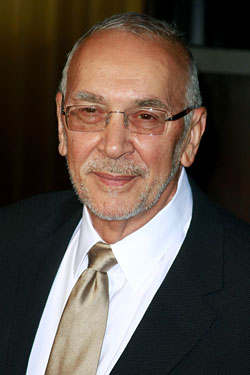
‘There was a Nobel Prize winner,” Frank Langella is saying, “who got up to get the prize and said, ‘Well, I guess this, like everything else, is a substitute for love.’ ” Langella has been talking about the defenses we all throw up every day, and specifically about his role in the Broadway revival of Terence Rattigan’s 1963 play Man and Boy. “It’s a very interesting subject for me, particularly at this time of my life, when you look back at your relationships and all of that stuff. Did I let her go for the right reason, or was it not wanting to get too close? I don’t understand it in me, and I don’t understand it in most of us, but we have a gene that makes us terrified of intimacy.”
Langella is 73 now, still vigorous, with a pleasing bit of wear on him. He tells me that he doesn’t have a single drug in his regimen, whether preventive, prescribed, or recreational. (“Though I loved marijuana, back when I was in my twenties.”) He’s found a great niche in the past decade or so, playing certain kinds of emotionally armored, intimidating guys—larger-than-life men who are scheming and groping for Nobel-quality substitutes. Think of his hyperintense Tricky Dick in Frost/Nixon, or his tour de force turn in the film Starting Out in the Evening. That big baritone of his helps give these guys gravitas, as does Langella’s physical size: He’s six-two and has the knack of looking about eleven feet tall onstage. Even as Nixon, with his head turtlishly pulled down between his shoulders.
Man and Boy is set during the Depression, and Langella’s Gregor Antonescu is a world-famous financier, one whose every move shifts entire economies. He’s a self-made man whose clever machinations have bought him a trophy wife and a European title to match, but it’s all hanging by a thread. He’s overleveraged and short on cash, and he is hiding out from a lot of lawyers and newspaper reporters. If he can just close one more merger, his liquidity (and maybe the world’s) will be restored and everything will be fine. For that to happen, he needs to turn to his son, Basil, to whom he hasn’t spoken in five years. Gregor has been telling his friends that his boy is dead, and here he’s borrowing the son’s crummy Greenwich Village basement apartment—and, eventually, Basil himself—to save his own skin. It’s a play (at least in part) about the way our parents remain idols into our own adulthood, even if they’re bad for us. As the play reaches its climax and Gregor’s allies begin to pull away, “the boy who loves him most in the world wants to stay with him,” the actor explains, “and he can’t handle it.”
Does Langella seek out those grand, nasty men? “I think so. I never questioned it—this is my 60th or 70th play, and I try not to look back, because that means you’re thinking about it being over. But when I do look at the list of parts I’ve played, I see I’ve been very attracted to monsters, good and bad, and I like plays in which I’m taken out of my time. It doesn’t interest me to play a guy in a hoodie and jeans—it just doesn’t. I like plays in which the character is grappling with something on a large scale.”
All the same, this one’s not an obvious choice to be revived. Rattigan’s play flopped not once but twice in 1963, in London and on Broadway. Its characters’ pivotal personal transgressions, shocking for that time, are merely seamy by today’s miserable standards. But it is also about a mogul whose scheming evokes Ken Lay and Bernie Madoff, giving it a fresh resonance. “You know,” Langella says, “when everything’s available, and everything can be fixed with money or power or position, it does really truly stunt personal growth. There’s no way that it can’t. Look, those of us who don’t have those megatoys still [run away from things]. So imagine if you’re having trouble with your wife or your boyfriend or whatever, and there’s a jet waiting—you can say ‘I’m just gonna go to Spain for a day.’ ” Gregor is pretty well buttressed against his emotions; most of what interests him is just winning. As the play progresses, we occasionally see twinges of regret, sometimes more. When confronted with the prospect of skipping town with his son, he is horrified: “How am I going to sit next to my conscience for four days in a car?”
Langella has a son and a daughter, both grown, and, in conversation, displays a paternalistic ease, asking a lot of questions. He offers some wise child-rearing advice and is surprisingly open about his own good and less good moments as a divorced parent. He mentions that the owner of the Upper West Side restaurant where we’re sitting, Henry’s, is his godson, and that he helped Henry through a rough teenage patch.
Only once while we’re talking does Langella seem to close up even slightly, and that’s when I mention the previous bloodthirsty Romanian count he played. On Broadway in 1977 and onscreen two years later, Dracula was the sleek evil character that first made him famous, and he came uncomfortably close to getting stuck in that cape, rendered permanently undead the way Bela Lugosi was. “It was a great two years, but a long time ago,” he says matter-of-factly. “The thing about Frost/Nixon is, it will change the first sentence of my obituary. Who knows what’s to come, but if it hadn’t come along, it would’ve been ‘famous for Dracula.’ ” (This time, as then, he has smartly decided to soft-pedal the Mitteleuropean accent.)
Though he says he’s not one to look back, he’s got a memoir coming out next spring: a book of 85 short chapters, each a memory of a friend (Elizabeth Taylor, Laurence Olivier, Marilyn Monroe, many more). It’s called Dropped Names: Famous Men and Women As I Knew Them. All these stories, he says, have emotional resonance, and he’s deliberately shied away from fact-checking himself. “I believe in the memory—whatever distortions it’s going lead you to. Memories are supposed to be selective. They’re my memories, not yours.”
Later that day, I do a little fact-checking of my own and look up that Nobel Prize presentation. The quote turns out to have been from Joseph Brodsky, and Langella has it a little wrong. The poet wasn’t just talking about love; he was also talking about the altered selves we create to get through our lives and fears—same as Gregor Antonescu, same as Richard Nixon, and the same, maybe, as the actor who played them. “If there is any substitute for love,” Brodsky wrote, “it’s memory.”
Man and Boy
By Terence Rattigan.
American Airlines theatre.
In previews for an October 9 opening.
